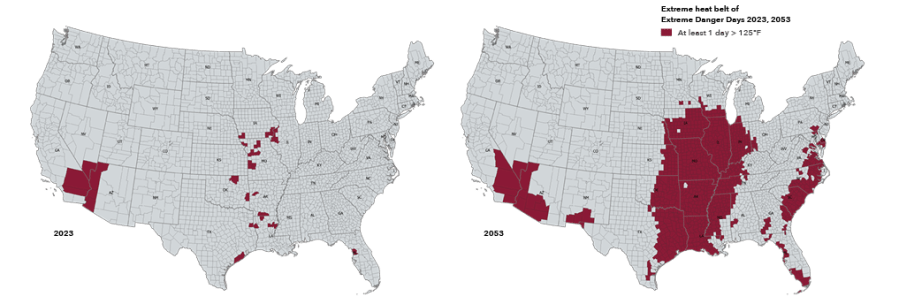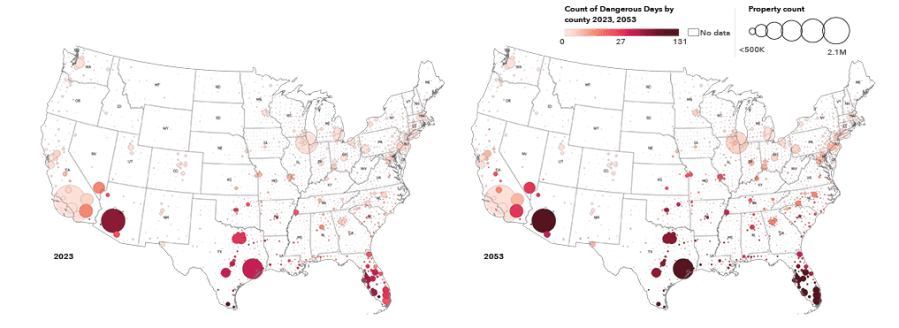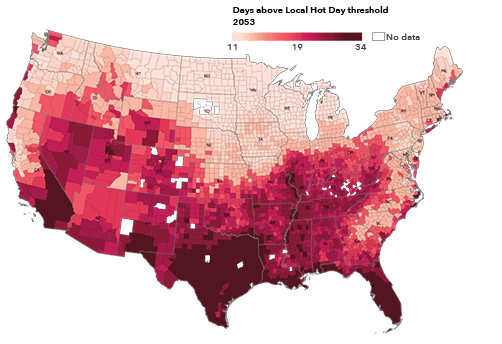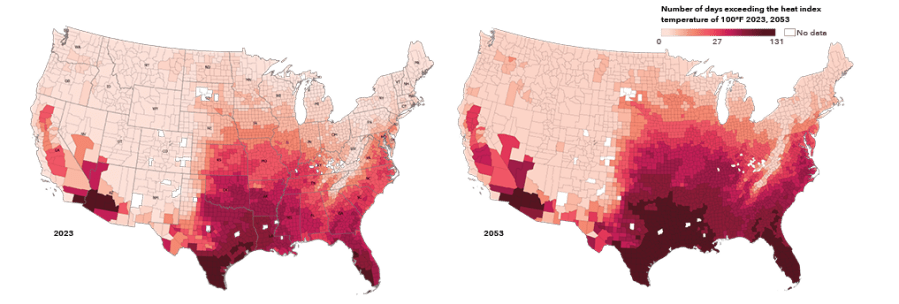(NEXSTAR) – A scorching July set a record in the continental U.S. for overnight warmth, and such evenings are projected to be far more commonplace as new models show the emergence of an “extreme heat belt” by 2053.
The so-called belt will include Northern Texas and states bordering the Gulf, stretching north to Illinois, Indiana, and even up to Wisconsin.
In 2023, 8.1 million Americans living in 50 counties will experience temperatures of at least 125 degrees, the highest classification on the National Weather Service’s Heat Index – “Extreme Danger,” according to nonprofit First Street Foundation’s peer-reviewed model.
Three decades later, the same model shows that climate change will cause 1,023 counties – home to 107.6 million people – will see temperatures rise above 125 degrees.

“Increasing temperatures are broadly discussed as averages, but the focus should be on the extension of the extreme tail events expected in a given year,” said Matthew Eby, founder and CEO of First Street Foundation. “We need to be prepared for the inevitable, that a quarter of the country will soon fall inside the Extreme Heat Belt with temperatures exceeding 125°F and the results will be dire.”

The model takes into account a number of factors including land surface temperatures, tree and other canopy cover, the presence of concrete and other impervious surfaces and the proximity to water. Researchers built the model under an established warming scenario in which greenhouse gas emissions reach their peak around 2040 and then begin to decline.
Not all counties in the study are set to change at the same rate. Florida’s Miami-Dade County, for example, will see the most extreme temperature shift in the country, according to the study. The county’s 7 hottest days are currently at 103 degrees, according to the study, a number that will jump to 34 days by 2053. For the rest of the country, the current average temperature of the hottest seven days is expected to occur on 18 days. Plainly said, temperatures that are setting records in states like Texas in 2023 will become more of the norm in 30 years, the study found.

The study found that “dangerous” days with a heat index exceeding 100 degrees occur more often in the southern half of the contiguous U.S., but especially in Florida and Texas. Starr County, Texas, topped all others in 2022 with 109 days above the threshold.

The 20 counties expected to see the most days over 100 degrees annually are located in Texas, California, Arizona and Florida, the report found, with the top four behind Starr County all being in Texas and California.
On Tuesday, President Biden signed into law designed to fight climate change, along with lowering prescription drug costs and a new corporate minimum tax to make businesses pay their share.
Democrats are calling the Inflation Reduction Act, which includes almost $375 billion over 10 years to fight climate change, “the single biggest climate investment in U.S. history, by far.”
Republicans have criticized the bill, accusing Democrats of government overreach.
“It will make the U.S. a global clean energy powerhouse and very likely we will look back on this as the start of a clean energy economic revolution in the same way we look back at the early 1990s as the IT revolution,” Josh Freed, leader of the climate and energy program at centrist Democratic think tank Third Way told The Hill.
Among tax rebates for buying electric vehicles and other incentives for “going green,” Democrats hope the bill will lead to a 40% decrease in greenhouse gas emissions by 2030.

